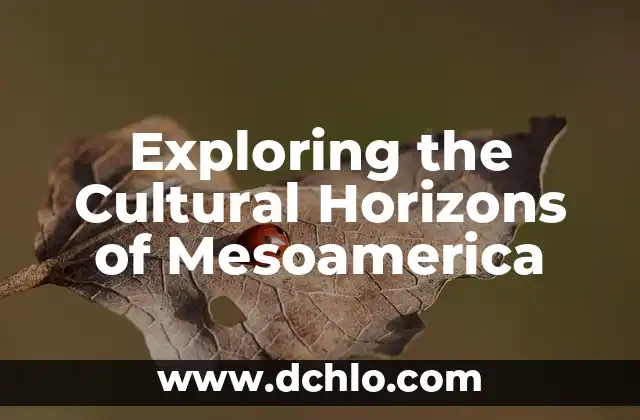The cultural horizons of Mesoamerica represent the dynamic periods of cultural influence and exchange that shaped the region’s rich history. This article delves into these significant eras, exploring their impact on the civilizations that flourished there.
What Are Cultural Horizons?
Cultural horizons refer to specific time frames where certain cultural traits and influences spread across various regions. In Mesoamerica, these horizons were marked by the rise and fall of civilizations like the Olmecs, Mayans, and Aztecs, each leaving a lasting legacy.
The Influence of Mesoamerican Cultures
The influence of Mesoamerican cultures extended beyond their immediate territories, impacting art, architecture, and societal structures. This influence can be seen in the shared cultural elements among different groups, despite their geographical separation.
Examples of Cultural Horizons in Mesoamerica
Key examples include the Olmec civilization, known for their colossal heads, the Maya for their advanced astronomy, and the Aztecs for their sophisticated agriculture. These civilizations represent distinct cultural horizons that shaped the region’s history.
También te puede interesar

/como-hacer-caminos-en-animal-crossing-new-horizons/

/como-hacer-un-castillo-en-animal-crossing-new-horizons/

Animal Crossing: New Horizons es uno de los juegos más populares de Nintendo Switch, y uno de los aspectos más emocionantes es decorar y personalizar nuestra isla. Sin embargo, para hacerlo, necesitamos materiales y recursos, y uno de los más...
The Spread of Innovation and Practices
The spread of innovations like writing systems, calendars, and architectural styles (such as pyramids) highlights the creative and intellectual prowess of Mesoamerican cultures. These practices were often adopted and adapted by subsequent civilizations.
Key Elements of Mesoamerican Cultural Horizons
Elements such as writing systems, astronomical knowledge, agricultural techniques, and architectural innovations were central to these cultural horizons. These elements not only defined each civilization but also laid the foundation for future societies.
[relevanssi_related_posts]The Legacy of Mesoamerica’s Cultural Impact
The legacy of Mesoamerica’s cultural horizons is evident in the modern-day traditions and structures that trace their origins to these ancient civilizations. Their influence endures in art, language, and cultural practices.
The Significance of Studying Cultural Horizons
Understanding these horizons provides insights into the social, political, and religious dynamics of Mesoamerican societies. This knowledge enriches our appreciation of their contributions to global culture and history.
Cultural Periods in Mesoamerica
Mesoamerican history is divided into periods like the Formative, Classic, and Post-Classic, each marked by distinct cultural developments. These periods reflect the evolution of societies and their cultural achievements.
Trade Networks and Cultural Exchange
Trade networks played a crucial role in the exchange of goods and ideas, facilitating cultural diffusion. This exchange was vital in shaping the diverse cultural landscape of Mesoamerica.
Defining Cultural Horizons
Cultural horizons are defined by the spread of cultural traits across different regions. In Mesoamerica, this term encapsulates the dynamic interaction and influence among civilizations over time.
The Origin of the Term
The term cultural horizons originates from archaeological studies, referring to the identifiable periods of cultural influence. In Mesoamerica, it highlights the distinct phases of cultural development.
Cultural Diffusion in Mesoamerica
Cultural diffusion in Mesoamerica was facilitated by trade, migration, and conquest. This process allowed for the sharing of knowledge and practices, enriching the cultural fabric of the region.
The Role of Cultural Horizons in Mesoamerica
These horizons were pivotal in shaping the identity of Mesoamerican civilizations. They reflect the adaptability and creativity of these societies as they evolved over time.
Using the Term and Examples
When discussing Mesoamerica, the term cultural horizons is used to describe periods like the Olmec or Maya eras. These examples illustrate the cultural achievements and exchanges that defined each era.
INDICE

